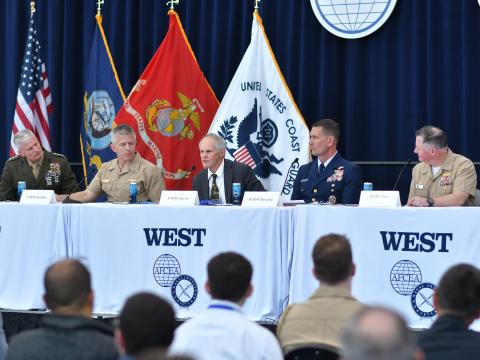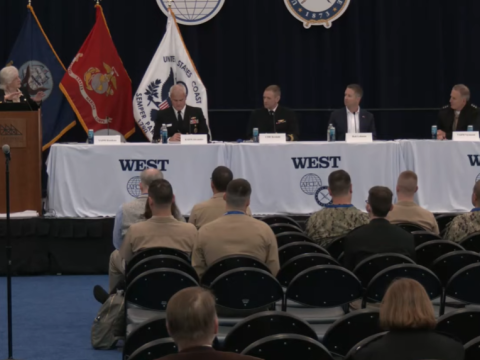Keep Your Friends Close and Your Alliances Closer
Sending a clear message of alliance, representatives from all Five Eyes nations—Australia, Canada, New Zealand, the United Kingdom and the United States—took part in the 35th annual WEST conference in San Diego. The speakers engaged in candid discussions, including debates over focus areas and military priorities.
Speaking during a January 29 panel focused on maritime security in the Indo-Pacific, Rear Adm. James Parkin, director develop for the Royal Navy United Kingdom, highlighted the impact of the Indo-Pacific region on the rest of the world.
“The Royal Navy withdrew from its last permanent base in the Indo-Pacific in 1971, but a few years ago, we realized that the world is so interconnected and that the requirements to show friendship, alliances and partnerships was so intense that we made a commitment at the highest level of government, which has survived changes of administration, that we would keep ships persistently deployed in the Indo-Pacific,” Parkin stated.
Since 2018, under Operation Highwall, the corvette-sized ships and vessels are able to access regions the United Kingdom has not had access to in 50 years, he went on. Parkin additionally mentioned Operation High Tide, which took place in Australia less than a year ago; as well as Operation High Mast, a carrier strike crew deployment, headed for the Indo-Pacific region in the next few months.
“What we learned from when we sent our carrier strike for deployment in 2021 was the convening power of having friendships, alliances and partnerships around the world,” Parkin said.
The rear admiral then drew attention to the first Five Eyes South China Sea transit, which also took place in 2021. “We were upholding the United Nations Convention on the Law of the Sea,” he continued. “To do that with all five nations from the Five Eyes community, to go through the South China Sea, sent a very powerful message that if you want to go fast, you do it alone, but if you want to go further, you do it with friends.”
The mission, Parkin said, was a “physical manifestation” of the power of alliances and friendship.
During a January 30 panel discussion, however, Vice Adm. Robert Thomas Jr., USN (Ret.), voiced concerns over the alliances’ areas of focus. Following remarks by Commodore Roger Readwin, naval attaché for the Royal Navy, Thomas called for a shift in priorities. “I kind of need him to pay attention to all things NATO … I really don’t need to see him in the South China Sea. There’s other things for him to do,” he stated.
Thomas, who served in the U.S. military for 38 years and was a career submarine officer, currently works as a lecturer at the School of Global Policy and Strategy at the University of California San Diego.
His statement was a continuation of remarks about the importance of balance between economy, diplomacy and military collaboration.
“The economic aspects for our Five Eyes … the more we collaborate economically, frankly, the better. As of January 20, there’s concern on what our trade relationships will look like going forward,” Thomas told the audience. “One of the things that we could all do is make sure that our economic house is in order. Strong allies with resilient economies, they fare pretty well against the other team,” referring to Russia, China, North Korea and Iran.
A collaboration of the Five Eyes, along with partners from Japan and South Korea, would bring together a strong enough gross domestic product against China and its alliances. “We’ve got to continue to make sure that balance is clearly in our favor, and if we don’t make sure we maintain alliances through trade agreements, we’re going to be in trouble,” Thomas warned.
Thomas went on to speak about the crucial role of diplomacy, voicing his concerns over funding. The U.S. Department of Defense, he said, is at a 10-to-1 ratio with the funding received by the U.S. Department of State. More monetary focus should be put on diplomatic alliances, Thomas continued. And while the Five Eyes nations are successful when it comes to military diplomacy, significant budgetary challenges remain.
“One of my proposals, and I get in trouble for this all the time, is if this was a body with five parts, each one of these parts has certain strengths, and there’s other things that they need to cut away from,” Thomas said.
New Zealand, for example, has geographical advantage, with strengths in expeditionary operations, maritime and airspace security, and humanitarian and disaster response. “If they take care of that, then the other parts of the team get a little bit of a break,” he said.
Regarding Australia, Thomas shared thoughts on AUKUS, a security partnership between Australia, the United Kingdom and the United States. On an Adelaide, Australia, trip two years ago, Thomas had “pleaded” with the Australian Royal Navy to make a change.
One of the things that we could all do is make sure that our economic house is in order. Strong allies with resilient economies, they fare pretty well against the other team.
“I put myself into the buzzsaw of all things AUKUS … and said, ‘Hey, do me a favor, AUKUS Pillar 1, now, this is coming from a nuclear submariner, just stop at phase one,’” he shared, retelling what he supposedly said to Australian counterparts. “’Make HMAS Stirling a better place to operate submarines, the U.S. Seventh Fleet will love you for that, trust me, but you have other things to do that are in your national interest.’”
Pillar 1 of AUKUS focuses on armed, nuclear-powered submarines.
“Stop being such a great ally and following the United States on every misadventure that we’ve been on over the last 100 years. Learn to say, ‘No,’” Thomas went on. More funding should be invested into AUKUS Pillar 2, he suggested.
The lecturer also had words for Canada. “Love that you cruise through the Taiwan Strait, but what I really need you to do is focus on the Arctic,” he said, pointing out significant adversarial advancements made in that region.
The United Kingdom, which according to Thomas is ahead of other Five Eyes nations when it comes to modern technologies such as artificial intelligence, uncrewed platforms, autonomous systems and hypersonics, should pay more focus on being the thought leaders of the group.
Seated next to Thomas was Rear Adm. S.M. Waddell, deputy commander for the Royal Canadian Navy. In response to his fellow panelist’s statements, Waddell brought attention to Canada’s recent update to its Arctic policy. The Arctic region, he said, is also heavily featured in the nation’s 2024 defense policy.
“With the delivery very shortly where six—yes, six—Arctic and offshore patrol vessels, and the investments that we are able to sustain in the Arctic, that allows that coverage in that northern flank that is so critical to allow the Five Eyes and other partners to focus on other areas as well,” he said. “It’s not easy when you look at the perspective that Canada finds itself in, and not only the traditional historical roots and of certainly the alliance commitments to NATO, to the Euro-Atlantic, but certainly the necessary investments in the Arctic. Adversaries are playing in that space; we know that; we know we need to respond and counter those movements, but the Indo-Pacific is fundamental to all of our economic prosperity and security attributes.”
The Indo-Pacific Strategy and updated defense policy offers a $70 billion investment over the next 20 years, including readiness resources to sustain up to three combatants into the Indo-Pacific every year. Remaining with the region is vitally important, Waddell explained.
WEST is co-hosted by AFCEA International and the U.S. Naval Institute. SIGNAL Media is the official media of AFCEA International.


Comments